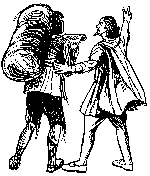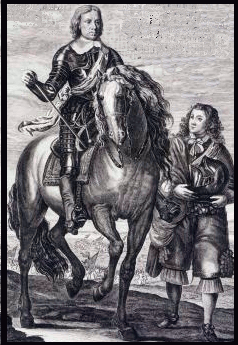
This Page Title – Men of the Awakening – William Grimshaw
The Wicket Gate Magazine "A Continuing Witness".
Internet Edition number 80– placed on line September 2009
Magazine web address – www.wicketgate.co.uk

The little village of Haworth on the howling Yorkshire moors is, perhaps, most readily associated in the average person's mind with the birth and life of the famed Charlotte Bronte, and not with the labours and preaching of a rustic old evangelical of the 18th century awakening. Such is the way of life; and whereas the world is inclined to embalm its heroes and heroines, the Church of Christ is more apt to neglect her's while they live, and forget them when they die. This would seem to be the case with William Grimshaw, Minister of the gospel at Haworth for twenty-one years, and one of the most used of that army of preaching giants that made the 18th century ring with the affirmations of the gospel of Jesus Christ.
Born in Brindle in Lancashire in 1708, William Grimshaw was ordained to the work of the ministry of grace twenty-three years later in 1731. His first two charges at Rochdale and Todmorden found him “a blind leader of the blind” for he had neither lot nor part in the things of salvation. During his stay in the latter parish, however, he began to enter into some troubles concerning the state of his soul before the Lord. At this time, there was “no eye to pity” him, however, and he continued under a sense of sin for almost two years, neither able to find relief for himself nor to impart it to others. “Put away these gloomy thoughts,” he once told a woman who came to him burdened under the knowledge of her sin, “Go into merry company, ”he told her, “and all will be well at last.”
Soon, however, the counsel of William Grimshaw to needy souls was to take up a different note, and the work which was begun in his soul at Todmorden was also established in that place, and “the full corn in the ear” was to be bountifully displayed during the years of harvest at Haworth.
Like the other men of the 18th century awakening in England, William Grimshaw was a fervent preacher of the gospel and had an overwhelming desire to see men and women brought into a knowledge of sins forgiven through Christ the Lord. But, there, the similarity between many of these men very often ended. George Whitefield is as different to John Wesley as Wesley is to old Rowland Hill, and William Grimshaw is probably different to all of them put together. Holding strong views as we do on the "independent" nature of the church, and knowing nothing in our doctrines of “parish ministries,” we find it hard to endorse on scriptural grounds many of the practices of the good vicar of Haworth.
However, who can but be impressed by the zeal of the man who would announce the opening psalm at his morning service and then, stick in hand, go out into the village and drive in the loiterers to hear the sermon? John Newton tells of a friend of his who was passing through Haworth on the Lord's Day, and, in passing one of the public houses “saw several persons making their escape out of it, some jumping out of the lower windows, and some over a low wall.” The friend was at first alarmed, says Newton, believing the premises to be on fire; but “upon inquiring the cause of the commotion, he was only told that they saw the parson coming.” Whenever he suspected some of his church members of being really hypocrites at heart, he would occasionally dress himself as a tramp and go to the person in question to beg some bread. If he were refused the kindness, he counted it as a vindication of his first suspicions. Being doubtful of the sincerity of the profession of an old woman whose eyesight had badly failed, he went to her house one day and with his stick began to prod her on the leg. He went on in this fashion until the old woman, believing it to be some children playing a trick on her, she broke out into a fit of swearing, and again, Grimshaw's fears were confirmed.
And let us remember that: they were genuine “fears” that he had for his people. Fears that they had less than the real thing in salvation; fears that they had not the root of the matter in their souls; fears that they would, at the last, be found wanting. So, what was a little eccentricity in practice and preaching if he could detect the true state of the souls of his parish and then apply the right kind of medicines for the good of those souls? It is this, probably, above all others that most distinguish the ministries of the past from those of our own day. It was the eternal state of the souls of men that was uppermost in the thought of the Lord's servants regardless of the temporal upsets or disturbances that were caused.
Of course, such behaviour left William Grimshaw an easy butt for slander and criticism. “Mad Grimshaw,” he was most often called. But, “He that winneth souls is wise.” And regardless of how any might view some of his more "outlandish" methods in his daily tasks, none can gainsay the sincerity of the man, nor the influence of his work upon the souls of men.
The following account is a typical record of his life and labours in and around Haworth. “With a slice of bread and an onion for his day's provision, he would trudge over the moors from dawn to summer-dusk in search of sheep in the wilderness, and after a night's rest in a hayloft would resume the work. In one of his weekly circuits he would think it no hardship to preach from twenty to thirty times. When he overtook a stranger on the solitary road, if riding, he would dismount and talk to him, and rivet his mind with a pathetic exhortation and word of prayer.” On one of these journeys, he came across an old woman who was finding the road long and weary as she made her way across the moors. He began to sympathise with her in her trials, but was soon told that she was going to “hear Grimshaw” and that, seeing her heart was there already, she would soon make the body follow. Without hesitation he hoisted her on to the back of his horse and both set off together to "hear Grimshaw".
The heart of the man was very large, indeed, and when friends would come to stay with him, he always made a practice of being up well before them in the mornings and personally cleaning and polishing their muddy boots. Like the others of his day, he preached “everywhere” “… a room, a barn, a field, a quarry, or by the roadside.” He saw many “sons brought to glory” during his lifetime and even after death was the instrument that God used to the conversion of his own son after the flesh. This fact may well serve as a comfort to those of the Lord's people eagerly seeking the conversion of their children and loved ones, yet up to this point, seeing no fruits for their labours. John Grimshaw only survived his father by three years, but during that time passed from death unto life in spiritual things. Shortly after his father's death he was accustomed to ride the horse on which his father used to traverse the countryside preaching the gospel. When this was remarked upon he was always heard to say, “Yes, it once carried a great saint, but now it carries a great sinner.” The knowledge of his sinnership soon became more than “head” knowledge, however, and John Grimshaw died in peace, believing in the God of his Godly father. Just before he died, he remarked to his friends, “What will my old father say when he sees I have got to heaven?” No doubt, he would say, “Hallelujah,” as he had done so often over sinners repenting at Haworth.

This Page Title – Men of the Awakening – William Grimshaw The Wicket Gate Magazine "A Continuing Witness". Internet Edition number 80– placed on line September 2009 Magazine web address – www.wicketgate.co.uk |